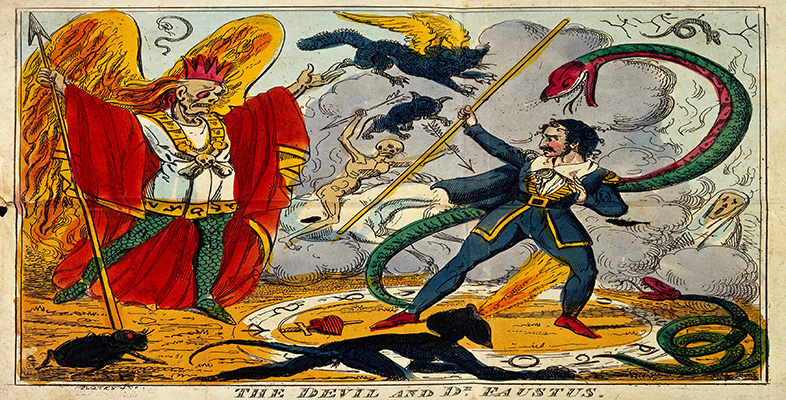1.2 Doctor Faustus
Critics who have studied Marlowe's work have for the most part been inclined to take on trust the picture of him provided by Kyd, Baines, Beard and others, and to read the plays as statements of the author's own radical beliefs. But there is an obvious problem with this approach to Marlowe's work: we simply don't know whether these hostile accounts of his opinions are accurate or, as seems likely, deeply compromised by their writers' own motives and circumstances.
Doctor Faustus is the most famous of Marlowe's plays, and its hero, who sells his soul to the devil in return for twenty-four years of power and pleasure, is by far the best known of his rebellious protagonists. Marlowe based the plot of his play on The History of the Damnable Life and Deserved Death of Doctor John Faustus (1592), an English translation of a German book (now known as the Faustbuch) about an actual historical figure who gained notoriety in early sixteenth-century Germany by dabbling in the occult. This story rapidly became the stuff of legend and, like most legends, it has been subject to numerous retellings, including the two-part play Faust (1808; 1832) by the German writer Goethe, the novel Doctor Faustus (1948) by Thomas Mann, and Peter Cook's and Dudley Moore's 1967 film Bedazzled (remade in 2000), which adapted the legend for comic ends.
Why did Marlowe choose to adapt the Faust legend for the stage? Was the free-thinking dramatist, as numerous critics have speculated, attracted to a story about a man who rebelled so flagrantly against the Christian God? One of the interesting questions to ask about Doctor Faustus is whether the play seems to strengthen or undermine the longstanding view of Marlowe as a maverick artist, and we will return to this question at the end of the course.
